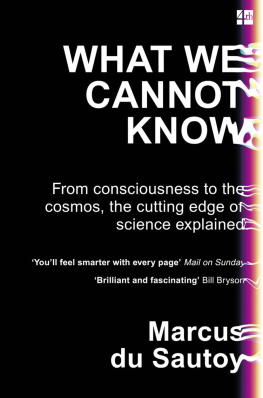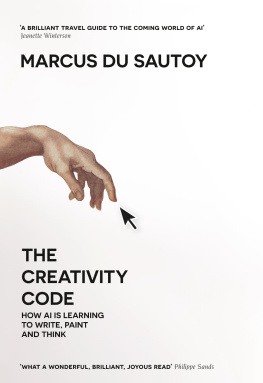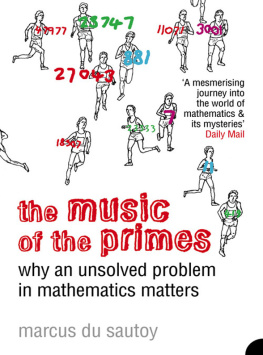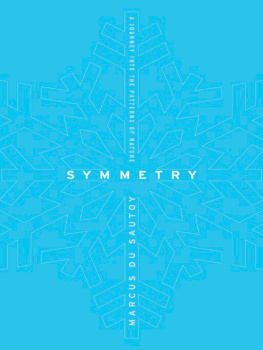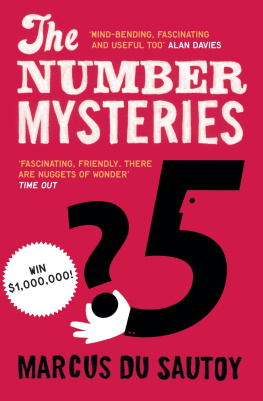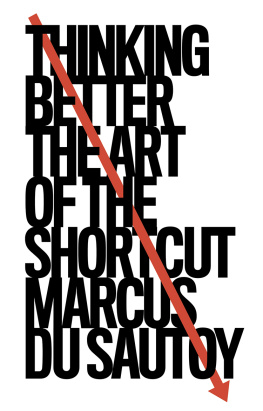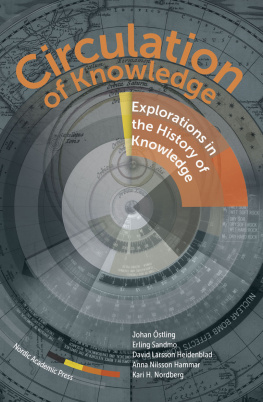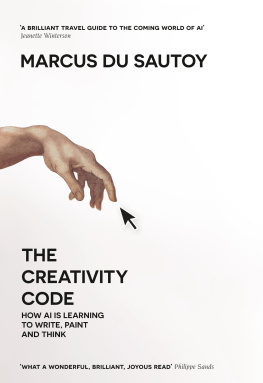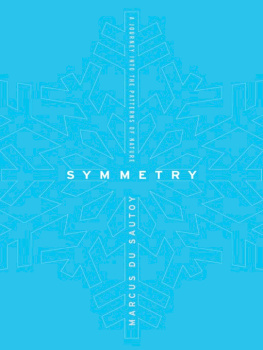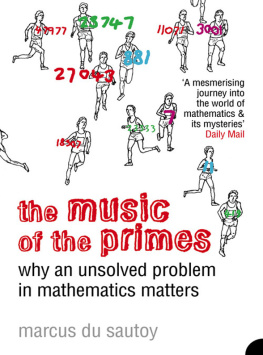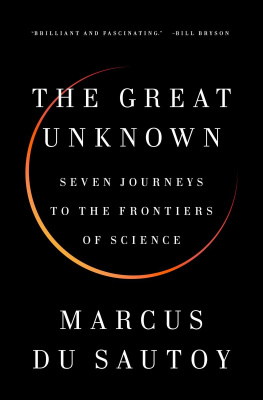Du Sautoy - What we cannot know: explorations at the edge of knowledge
Here you can read online Du Sautoy - What we cannot know: explorations at the edge of knowledge full text of the book (entire story) in english for free. Download pdf and epub, get meaning, cover and reviews about this ebook. City: London, year: 2017;2016, publisher: HarperCollins Publishers;Fourth Estate, genre: Science fiction. Description of the work, (preface) as well as reviews are available. Best literature library LitArk.com created for fans of good reading and offers a wide selection of genres:
Romance novel
Science fiction
Adventure
Detective
Science
History
Home and family
Prose
Art
Politics
Computer
Non-fiction
Religion
Business
Children
Humor
Choose a favorite category and find really read worthwhile books. Enjoy immersion in the world of imagination, feel the emotions of the characters or learn something new for yourself, make an fascinating discovery.
- Book:What we cannot know: explorations at the edge of knowledge
- Author:
- Publisher:HarperCollins Publishers;Fourth Estate
- Genre:
- Year:2017;2016
- City:London
- Rating:5 / 5
- Favourites:Add to favourites
- Your mark:
- 100
- 1
- 2
- 3
- 4
- 5
What we cannot know: explorations at the edge of knowledge: summary, description and annotation
We offer to read an annotation, description, summary or preface (depends on what the author of the book "What we cannot know: explorations at the edge of knowledge" wrote himself). If you haven't found the necessary information about the book — write in the comments, we will try to find it.
What we cannot know: explorations at the edge of knowledge — read online for free the complete book (whole text) full work
Below is the text of the book, divided by pages. System saving the place of the last page read, allows you to conveniently read the book "What we cannot know: explorations at the edge of knowledge" online for free, without having to search again every time where you left off. Put a bookmark, and you can go to the page where you finished reading at any time.
Font size:
Interval:
Bookmark:



4th Estate
An imprint of HarperCollinsPublishers
1 London Bridge Street
London SE1 9GF
www.4thestate.co.uk
First published in Great Britain by 4th Estate in 2016
This 4th Estate paperback edition 2017
Copyright Marcus du Sautoy 2016
Cover design Jonathan Pelham
The right of Marcus du Sautoy to be identified as the author of this work has been asserted by him in accordance with the Copyright, Designs and Patents Act 1988
A catalogue record for this book is available from the British Library
All rights reserved under International and Pan-American Copyright Conventions. By payment of the required fees, you have been granted the non-exclusive, non-transferable right to access and read the text of this e-book on-screen. No part of this text may be reproduced, transmitted, down-loaded, decompiled, reverse engineered, or stored in or introduced into any information storage and retrieval system, in any form or by any means, whether electronic or mechanical, now known or hereinafter invented, without the express written permission of HarperCollins.
Source ISBN: 9780007576593
Ebook Edition 2017 ISBN: 9780007576579
Version: 2017-04-01
To my parents,
who started me on my journey
to the edges of knowledge
CONTENTS
Everyone by nature desires to know.
Aristotle, Metaphysics
Science is king.
Every week, headlines announce new breakthroughs in our understanding of the universe, new technologies that will transform our environment, new medical advances that will extend our lives. Science is giving us unprecedented insights into some of the big questions that have challenged humanity ever since weve been able to formulate those questions. Where did we come from? What is the ultimate destiny of the universe? What are the building blocks of the physical world? How does a collection of cells become conscious?
In the last ten years alone weve landed a spaceship on a comet, made robots that can create their own language, used stem cells to repair the pancreas of diabetic patients, discovered how to use the power of thought alone to manipulate a robotic arm, sequenced the DNA of a 50,000-year-old cave girl. Science magazines are bursting with the latest breakthroughs emerging from the worlds laboratories. We know so much. The advances of science are extremely intoxicating.
Science has given us our best weapon in our fight against fate. Instead of giving in to the ravages of disease and natural disaster, science has created vaccines to combat deadly viruses like polio and even ebola. Faced with an escalating world population, it is scientific advances that provide the best hope of feeding the 9.6 billion people who are projected to be alive in 2050. It is science that is warning us about the deadly impact we are having on our environment and giving us the chance to do something about it before it is too late. An asteroid might have wiped out the dinosaurs, but the science that humans have developed is our best shield against any future direct hits. In the human races constant battle with death, science is its best ally.
Science is king not only when it comes to our fight for survival but also in improving our quality of life. We are able to communicate with friends and family across vast distances. We have unparalleled access to the database of knowledge we have accumulated over generations of investigation. We have created virtual worlds that we can escape to in our leisure time. We can recreate in our living rooms the great performances of Mozart, Miles and Metallica at the press of a button.
That desire to know is programmed into the human psyche. Those early humans with a thirst for knowledge are those who have survived, adapted, transformed their environment. Those not driven by that craving were left behind. Evolution has favoured the mind that wants to know the secrets of how the universe works. The adrenaline rush that accompanies the discovery of new knowledge is natures way of telling us that the desire to know is as important as the drive to reproduce. As Aristotle articulated in the opening line of his book Metaphysics, understanding how the world works is a basic human need.
As a schoolkid, science very quickly drew me into its outstretched arms. I fell in love with its extraordinary power to tell us so much about the universe. The fantastic stories that my science teachers told seemed even more fanciful than the fiction Id been reading at home. As it worked its spell on me I consumed every outlet of science I could get my hands on.
I persuaded my parents to buy me a subscription to New Scientist. I devoured Scientific American in our local library. I hogged the television each week to watch episodes of my favourite science programmes: Horizon and Tomorrows World. I was captivated by Jacob Bronowskis Ascent of Man, Carl Sagans Cosmos, Jonathan Millers Body in Question. Every Christmas the Royal Institution Christmas Lectures provided a good dollop of science alongside our family turkey. My stocking was stuffed with books by Gamow and Feynman. It was a heady time, with new breakthroughs being announced each week.
Alongside reading these stories of the discovery of things we know, I began to get more fired up by the untold tales. What we knew lay in the past but what we didnt yet know was the future, my future. I became obsessed with the puzzle books of mathematician Martin Gardner that my maths teacher gave me. The excitement of wrestling with a conundrum and the sudden release of euphoria as I cracked each puzzle got me addicted to the drug of discovery. Those puzzles were my training ground for the greater challenge of tackling questions that didnt have an answer in the back of the book. It was the unanswered questions, the mathematical mysteries and scientific puzzles that no one had cracked that would become the fuel for my life as a scientist.
If I look back to the Seventies when I was at school and compare the things that we knew then to what we know now, it is quite extraordinary how much more we have understood about the universe even in the half century that Ive been alive. Technology has extended our senses so we can see things that were beyond the conception of the scientists who excited me as a kid.
The new range of telescopes that look out at the night sky have discovered planets like the Earth that could be home to intelligent life. They have revealed the amazing fact that three-quarters of the way into the lifetime of our universe the expansion of the universe started to accelerate. I remember reading as a kid that we were in for a big crunch, but now it seems that we have a completely different future waiting for us.
The particle colliders like the Large Hadron Collider at CERN (the European Organization for Nuclear Research in Switzerland) have allowed us to penetrate the inner workings of matter itself, revealing new particles like the top quark discovered in 1994 and the Higgs boson discovered in 2012 that were bits of speculative mathematics when I was reading my New Scientist at school.
And since the early Nineties the fMRI scanner has allowed us to look inside the brain and discover things that in the Seventies were frankly not even considered part of the remit of scientists. The brain was the preserve of philosophers and theologians, but today the technology can reveal when you are thinking about Jennifer Aniston or predict what you are going to do next even before you know.
Font size:
Interval:
Bookmark:
Similar books «What we cannot know: explorations at the edge of knowledge»
Look at similar books to What we cannot know: explorations at the edge of knowledge. We have selected literature similar in name and meaning in the hope of providing readers with more options to find new, interesting, not yet read works.
Discussion, reviews of the book What we cannot know: explorations at the edge of knowledge and just readers' own opinions. Leave your comments, write what you think about the work, its meaning or the main characters. Specify what exactly you liked and what you didn't like, and why you think so.

